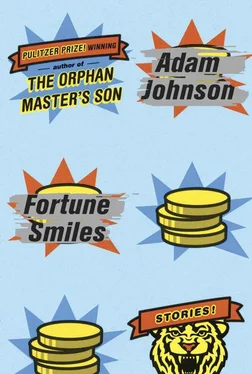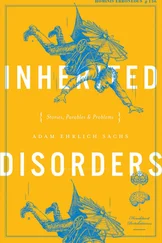Adam Johnson
Fortune Smiles: Stories
In memory of
Thomas Mannarino, 1964–2007,
and
Eric Rogers, 1970–2012

It’s late, and I can’t sleep. I raise a window for some spring Palo Alto air, but it doesn’t help. In bed, eyes open, I hear whispers, which makes me think of the president, because we often talk in whispers. I know the whispering sound is really just my wife, Charlotte, who listens to Nirvana on her headphones all night and tends to sleep-mumble the lyrics. Charlotte has her own bed, a mechanical one.
My sleep problem is this: when I close my eyes, I keep visualizing my wife killing herself. More like the ways she might try to kill herself, since she’s paralyzed from the shoulders down. The paralysis is quite temporary, though good luck trying to convince Charlotte of that. She slept on her side today, to fight the bedsores, and there was something about the way she stared at the safety rail at the edge of the mattress. The bed is voice-activated, so if she could somehow get her head between the bars of the safety rail, “incline” is all she’d have to say. As the bed powered up, she’d be choked in seconds. And then there’s the way she stares at the looping cable that descends from the Hoyer Lift, which swings her in and out of bed.
But my wife doesn’t need an exotic exit strategy, not when she’s exacted a promise from me to help her do it when the time comes.
I rise and go to her, but she’s not listening to Nirvana yet — she tends to save it for when she needs it most, after midnight, when her nerves really start to crackle.
“I thought I heard a noise,” I tell her. “Kind of a whisper.”
Short, choppy hair frames her drawn face, skin faint as refrigerator light.
“I heard it, too,” she says.
In the silver dish by her voice remote is a half-smoked joint. I light it for her and hold it to her lips.
“How’s the weather in there?” I ask.
“Windy,” she says through the smoke.
Windy is better than hail or lightning or, God forbid, flooding, which is the sensation she felt when her lungs were just starting to work again. But there are different kinds of wind.
I ask, “Windy like a whistle through window screens, or windy like the rattle of storm shutters?”
“A strong breeze, hissy and buffeting, like a microphone in the wind.”
She smokes again. Charlotte hates being stoned, but she says it quiets the inside of her. She has Guillain-Barré syndrome, a condition in which her immune system attacks the insulation around her nerves so that when the brain sends signals to the body, the electrical impulses ground out before they can be received. A billion nerves inside her send signals that go everywhere, nowhere. This is the ninth month, a month that is at the edge of the medical literature. It’s a place where the doctors no longer feel qualified to tell us whether Charlotte’s nerves will begin to regenerate or she will be stuck like this forever.
She exhales, coughing. Her right arm twitches, which means her brain has attempted to tell her arm to rise and cover the mouth. She tokes again, and through the smoke she says, “I’m worried.”
“What about?”
“You.”
“You’re worried about me?”
“I want you to stop talking to the president. It’s time to accept reality.”
I try to be lighthearted. “But he’s the one who talks to me.”
“Then stop listening. He’s gone. When your time comes, you’re supposed to fall silent.”
Reluctantly, I nod. But she doesn’t understand. Stuck in this bed, having sworn off TV, she’s probably the only person in America who didn’t see the assassination. If she’d beheld the look in the president’s eyes when his life was taken, she’d understand why I talk to him late at night. If she could leave this room and feel the nation trying to grieve, she’d know why I reanimated the commander in chief and brought him back to life.
“Concerning my conversations with the president,” I say, “I just want to point out that you spend a third of your life listening to Nirvana, whose songs are by a guy who blew his brains out.”
Charlotte tilts her head and looks at me like I’m a stranger. “Kurt Cobain took the pain of his life and made it into something that mattered. What did the president leave behind? Uncertainties, emptiness, a thousand rocks to overturn.”
She talks like that when she’s high. I tap out the joint and lift her headphones.
“Ready for your Nirvana?” I ask.
She looks toward the window. “That sound, I hear it again,” she says.
At the window, I peer out into the darkness. It’s a normal Palo Alto night — the hiss of sprinklers, blue recycling bins, a raccoon digging in the community garden. Then I notice it, right before my eyes, a small black drone, hovering. Its tiny servos swivel to regard me. Real quick, I snatch the drone out of the air and pull it inside. I close the window and curtains, then study the thing: its shell is made of black foil stretched over tiny struts, like the bones of a bat’s wing. Behind a propeller of clear cellophane, a tiny infrared engine throbs with warmth.
“Now will you listen to me?” Charlotte asks. “Now will you stop this president business?”
“It’s too late for that,” I tell her, and release the drone. As if blind, it bumbles around the room. Is it autonomous? Has someone been operating it, someone watching our house? I lift it from its column of air and flip off its power switch.
Charlotte looks toward her voice remote. “Play music,” she tells it.
Closing her eyes, she waits for me to place the headphones on her ears, where she will hear Kurt Cobain come to life once more.
—
I wake later in the night. The drone has somehow turned itself on and is hovering above my body, mapping me with a beam of soft red light. I toss a sweater over it, dropping it to the floor. After making sure Charlotte is asleep, I pull out my iProjector. I turn it on, and the president appears in three dimensions, his torso life-size in an amber glow.
He greets me with a smile. “It’s good to be back in Palo Alto,” he says.
My algorithm has accessed the iProjector’s GPS chip and searched the president’s database for location references. This one came from a commencement address he gave at Stanford back when he was a senator.
“Mr. President,” I say. “I’m sorry to bother you again, but I have more questions.”
He looks into the distance, contemplative. “Shoot,” he says.
I move into his line of sight but can’t get him to look me in the eye. That’s one of the design problems I ran across.
“Did I make a mistake in creating you, in releasing you into the world?” I ask. “My wife says that you’re keeping people from mourning, that this you keeps us from accepting the fact that the real you is gone.”
The president rubs the stubble on his chin. He looks down and away.
“You can’t put the genie back in the bottle,” he says.
Which is eerie, because that’s a line he spoke on 60 Minutes, a moment when he expressed regret for legalizing drones for civilian use.
“Do you know that I’m the one who made you?” I ask.
“We are all born free,” he says. “And no person may traffic in another.”
“But you weren’t born,” I tell him. “I wrote an algorithm based on the Linux operating kernel. You’re an open-source search engine married to a dialog bot and a video compiler. The program scrubs the Web and archives a person’s images and videos and data — everything you say, you’ve said before.”
Читать дальше













